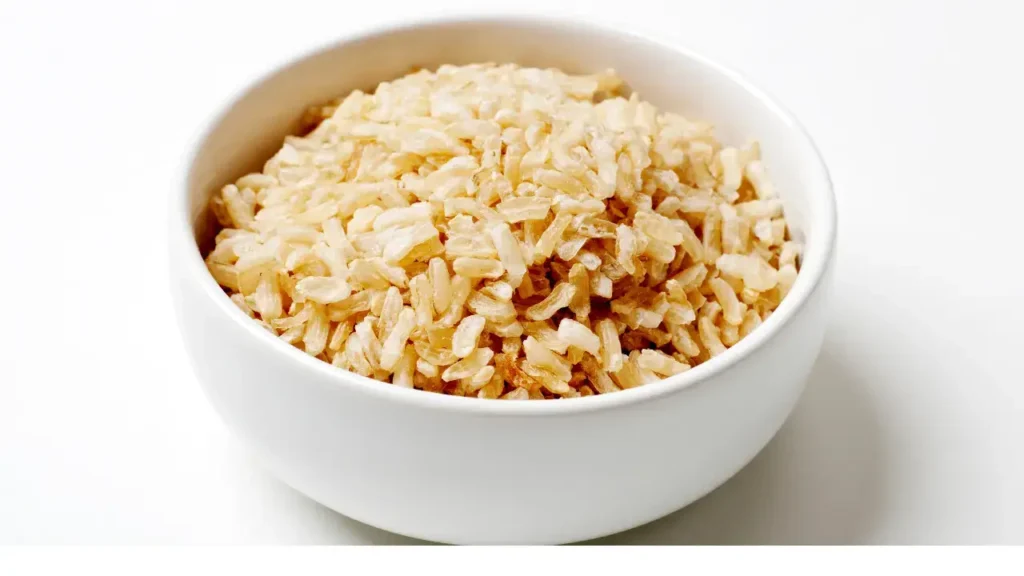It’s important to provide quality, nutritious food to our dogsWe’ll delve into the topic of dogs and rice by answering questions such as “Do dogs eat rice?” and “Is rice good for dogs?” We also look at the benefits and side effects of feeding your four-legged friend with specific information on brown rice.
As pet owners, we want to provide the best care for our beloved dogs. Nutrition plays a crucial role in keeping our canine companions healthy and happy. One common question that arises is whether it’s safe to include rice in their diet.
In this comprehensive guide, we’ll explore the world of rice and dogs, addressing common questions such as the safety of rice consumption, recommended serving sizes, benefits, and the best type of rice for our furry friends.
1. Can Dogs Eat Rice?
Yes, dogs can eat rice. Rice is a common ingredient found in many commercial dog foods and homemade dog meals. Rice is simple food and is often used to feed a dog with a weak stomach or recovering from an illness. However, remember that not all cereals are suitable for dogs.

2. Is Rice Good for Dogs?
Rice can be beneficial to a dog’s diet for several reasons.
Firstly, it is a great carbohydrate source, which provides energy for your canine companion. Dogs need a balance of nutrients, and carbohydrates play an important role in meeting their energy needs.
Secondly, rice is gentle on the digestive system. It is easy to digest and can help soothe stomach cramps and relieve diarrhea in dogs. Plain, cooked rice, without spices or additives, is best when it is.
Finally, rice is gluten-free, making it suitable for dogs with special dietary restrictions or sensitivities. If dogs are allergic or intolerant to gluten, rice can be a safe alternative to other gluten grains.
3. Can Dogs Eat Brown Rice?
Yes, dogs can eat brown rice. Brown rice is a whole grain that retains its bran and germ layers, offering higher nutritional value compared to white rice. Rice contains more fiber, vitamins, and minerals, making it a healthier option for dogs.
The fiber content in brown rice promotes healthy digestion and can aid in maintaining a regular bowel movement for your furry friend. The nutrients in brown rice, such as manganese and selenium, support the dog’s overall health.
It is very important to cook rice thoroughly to avoid stomach problems. Uncooked rice can be difficult to digest and can cause irritation or constipation in your dog.

4. Considerations and Recommendations:
Although rice can be an important part of a pet’s diet, it should be replaced in a balanced diet or as a primary source of nutrients. Dogs require a balanced diet that combines lean protein, healthy fats, and a mix of fruits and vegetables to meet all their nutritional needs.
When feeding your dog rice, it is important to follow these recommendations:
- Serve plain, cooked rice without any seasonings, sauces, or additives. Avoid using salt, spices, or oils, as these can harm dogs.
2. Introduce rice gradually into your dog’s diet. Start with small portions and observe how your dog’s digestive system responds. If any signs of gastrointestinal upset occur, consult your veterinarian.
3. Use rice as an occasional addition to your dog’s meals or as a temporary dietary solution for digestive issues. It should not replace balanced and nutritionally complete dog food.
4. Consult a veterinarian before making any significant changes to the dog’s diet. They can provide tailored advice based on the dog’s specific needs, age, breed, and any existing health conditions.
Benefits of Feeding Rice to Dogs
1. Digestive Health: Rice can be beneficial for dogs with sensitive stomachs or digestive issues. Its bland nature makes it easy on the stomach, and it can help soothe gastrointestinal disturbances.
2. Energy Source: The carbohydrates in rice can provide a quick energy boost for active dogs. This can be especially beneficial for working dogs or those participating in high-intensity activities.
3. Weight Management: Rice is a low-fat food that can be included in a weight management plan for overweight dogs. Its high fiber content can help dogs feel full while consuming fewer calories.
4. Dietary Variety: Incorporating rice into a dog’s diet adds variety and good option for dogs who have allergies or sensitivities to other grains.
Conclusion
Rice can be a safe and beneficial addition to your dog. When prepared and fed appropriately, rice can be a safe and beneficial addition to a dog’s diet.
It can provide energy, aid digestion, and contribute to dietary variety. However, it should never replace a well-balanced diet specifically formulated for dogs. As with any dietary change, it is important to consult with a veterinarian to determine the best approach for your dog.
While dogs can eat rice, it is not recommended to feed them rice every day as it should not replace a balanced diet. Variety is key to ensuring they receive all the necessary nutrients.
Rice for dogs should be cooked thoroughly without any seasonings or additives. Plain-boiled rice is the safest option.
Although rare, some dogs may be allergic or sensitive to rice. Monitor your dog closely for any signs of an adverse reaction after introducing rice into their diet.
Yes, rice can be beneficial for dogs with diarrhea. Its bland nature and high fiber content can help firm up their stools and alleviate digestive issues.
Brown rice is generally considered more nutritious for dogs due to its higher fiber content and retained bran and germ layers. However, white rice can still be a suitable option for specific dietary needs.
Rice pudding often contains ingredients like sugar, milk, and flavorings that are not suitable for dogs. It is best to avoid feeding rice pudding to your canine companion.
Both brown and white rice can be suitable for dogs. Brown rice is generally more nutritious due to its higher fiber content and retained bran and germ layers. However, white rice can still be a viable option for dogs with specific dietary needs.
While dogs can eat rice, it is not recommended to feed them rice every day as it should not replace a balanced diet. Variety is key to ensuring they receive all the necessary nutrients.
To cook rice for dogs, follow these steps:
1. Rinse the rice thoroughly to remove any dirt or debris.
2. In a pot, combine the rice with the appropriate amount of water
3. Bring the mixture to a boil, then reduce the heat and cover the pot.
4. Allow the rice to simmer for about 45 minutes or until it is cooked and tender.
5. Let the rice cool before serving it to your dog.
When it comes to dogs with diarrhea, plain white rice is often recommended. Its bland nature and high fiber content can help firm up their stools and alleviate digestive issues.











